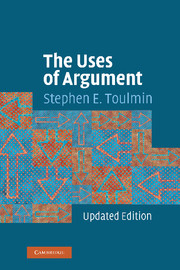Book contents
- Frontmatter
- Contents
- Preface to the Updated Edition
- Preface to the Paperback Edition
- Preface to the First Edition
- Introduction
- I Fields of Argument and Modals
- II Probability
- III The Layout of Arguments
- IV Working Logic and Idealised Logic
- V The Origins of Epistemological Theory
- Conclusion
- References
- Index
Preface to the First Edition
Published online by Cambridge University Press: 05 June 2012
- Frontmatter
- Contents
- Preface to the Updated Edition
- Preface to the Paperback Edition
- Preface to the First Edition
- Introduction
- I Fields of Argument and Modals
- II Probability
- III The Layout of Arguments
- IV Working Logic and Idealised Logic
- V The Origins of Epistemological Theory
- Conclusion
- References
- Index
Summary
The intentions of this book are radical, but the arguments in it are largely unoriginal. I have borrowed many lines of thought from colleagues and adapted them to my own purposes: just how many will be apparent from the references given at the end. Yet I think that hitherto the point on which these lines of argument converge has not been properly recognised or stated; for by following them out consistently one is led (if I am not mistaken) to reject as confused a conception of ‘deductive inference’ which many recent philosophers have accepted without hesitation as impeccable. The only originality in the book lies in my attempt to show how one is led to that conclusion. If the attack on ‘deductive inference’ fails, what remains is a miscellany of applications of other people's ideas to logical topics and concepts.
Apart from the references to published work given in passing or listed at the end of the book, I am conscious of a general debt to Professor John Wisdom: his lectures at Cambridge in 1946–7 first drew my attention to the problem of ‘trans-type inference’, and the central thesis of my fifth essay was argued in far greater detail in his Gifford Lectures at Aberdeen, which were delivered some seven years ago but are still, to our loss, unpublished.
- Type
- Chapter
- Information
- The Uses of Argument , pp. xiii - xivPublisher: Cambridge University PressPrint publication year: 2003



